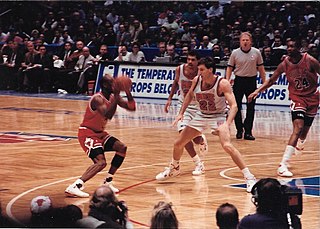
Basketball is a team sport in which two teams, most commonly of five players each, opposing one another on a rectangular court, compete with the primary objective of shooting a basketball through the defender's hoop, while preventing the opposing team from shooting through their own hoop. A field goal is worth two points, unless made from behind the three-point line, when it is worth three. After a foul, timed play stops and the player fouled or designated to shoot a technical foul is given one, two or three one-point free throws. The team with the most points at the end of the game wins, but if regulation play expires with the score tied, an additional period of play (overtime) is mandated.
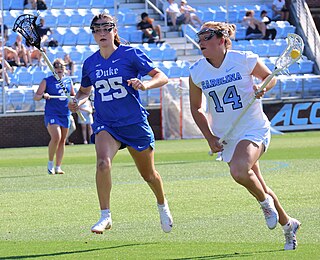
Women's lacrosse, sometimes shortened to lax, is a field sport played at the international level with two opposing teams of ten players each. Originally played by indigenous peoples of the Americas, the modern women's game was introduced in 1890 at the St Leonard's School in St Andrews, Scotland. The rules of women's lacrosse differ significantly from men's field lacrosse. The two are often considered to be different sports with a common root.
In basketball, a technical foul is any infraction of the rules penalized as a foul which does not involve physical contact during the course of play between opposing players on the court, or is a foul by a non-player. The most common technical foul is for unsportsmanlike conduct. Technical fouls can be assessed against players, bench personnel, the entire team, or even the crowd. These fouls, and their penalties, are more serious than a personal foul, but not necessarily as serious as a flagrant foul.

A shot clock is a countdown timer used in a variety of games and sports, indicating a set amount of time that a team may possess the object of play before attempting to score a goal. Shot clocks are used in several sports including basketball, water polo, canoe polo, lacrosse, poker, ringette, korfball, tennis, ten-pin bowling, and various cue sports. It is analogous with the play clock used in American and Canadian football, and the pitch clock used in baseball. This article deals chiefly with the shot clock used in basketball.
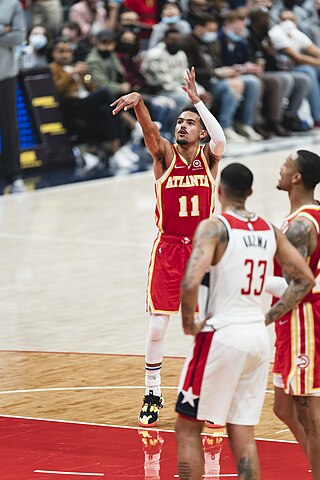
In basketball, free throws or foul shots are unopposed attempts to score points by shooting from behind the free-throw line, a line situated at the end of the restricted area. Free throws are generally awarded after a foul on the shooter by the opposing team, analogous to penalty shots in other team sports. Free throws are also awarded in other situations, including technical fouls, and when the fouling team has entered the bonus/penalty situation. Also, depending on the situation, a player may be awarded between one and three free throws. Each successful free throw is worth one point.
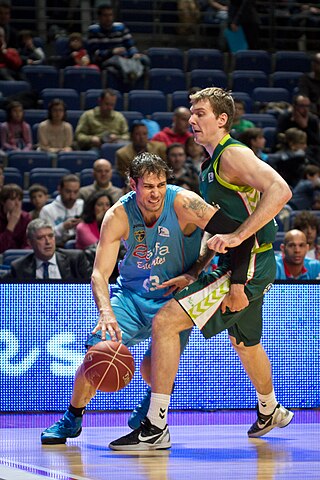
In basketball, a personal foul is a breach of the rules that concerns illegal personal contact with an opponent. It is the most common type of foul in basketball. A player fouls out on reaching a limit on personal fouls for the game and is disqualified from participation in the remainder of the game.

In sports, a time-out or timeout is a halt in the play. This allows the coaches of either team to communicate with the team, e.g., to determine strategy or inspire morale, as well as to stop the game clock. Time-outs are usually called by coaches or players, although for some sports, TV timeouts are called to allow media to air commercial breaks. Teams usually call timeouts at strategically important points in the match, or to avoid the team being called for a delay of game-type violation, such as the five-second rule in basketball.

The rules of basketball are the rules and regulations that govern the play, officiating, equipment and procedures of basketball. While many of the basic rules are uniform throughout the world, variations do exist. Most leagues or governing bodies in North America, the most important of which are the National Basketball Association and NCAA, formulate their own rules. In addition, the Technical Commission of the International Basketball Federation (FIBA) determines rules for international play; most leagues outside North America use the complete FIBA ruleset.

In sports, an ejection is the removal of a participant from a contest due to a violation of the sport's rules. The exact violations that lead to an ejection vary depending upon the sport, but common causes for ejection include unsportsmanlike conduct, violent acts against another participant that are beyond the sport's generally accepted standards for such acts, abuse against officials, violations of the sport's rules that the contest official deems to be egregious, or the use of an illegal substance to better a player's game. Most sports have provisions that allow players to be ejected, and many allow for the ejection of coaches, managers, or other non-playing personnel. In sports that use penalty cards, a red card is often used to signal dismissals. In some sports, another player is permitted to enter the game in place of the player who has been ejected, but in others the team is required to continue the game with a reduced number of players.

In basketball, a flagrant foul is a personal foul that involves excessive or violent contact that could injure the fouled player. A flagrant foul may be unintentional or purposeful; the latter type is also called an "intentional foul" in the National Basketball Association (NBA). However, not all intentional fouls are flagrant fouls, as it is an accepted strategy to intentionally commit a foul in order to regain possession of the ball while minimizing how much time elapses on the game clock.

This glossary of basketball terms is a list of definitions of terms used in the game of basketball. Like any other major sport, basketball features its own extensive vocabulary of unique words and phrases used by players, coaches, sports journalists, commentators, and fans.

Unsportsmanlike conduct is a foul or offense in many sports that violates the sport's generally accepted rules of sportsmanship and participant conduct. Examples include verbal abuse, taunting of an opponent or a game official, an excessive celebration following a significant play, or feigning injury. The official rules of many sports include a general provision whereby participants or an entire team may be penalized or otherwise sanctioned for unsportsmanlike conduct.

The Gus Macker 3-on-3 Basketball Tournament is a nationwide event for players of a variety of age and skill levels in the United States. Although every tournament is different, a typical Gus Macker event involves basketball courts set up in parking lots or closed-off public streets. Tournaments are mid-level to major sports media events and are held virtually every weekend from spring through summer.
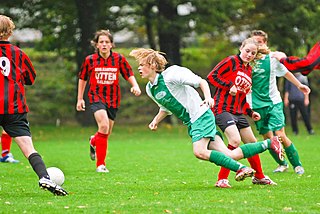
In sports, a foul is an inappropriate or unfair act by a player as deemed by a referee, usually violating the rules of the sport or game. A foul may be intentional or accidental, and often results in a penalty. Even though it may not be intentional, fouling can still cause serious harm or injury to opposing players, or even their own players if unaware of their surroundings during particular situations on sports. Fouls are used in many different sports. Often own teammates can clash and foul each other by accident, such as both going for and with eyes on a ball in AFL. Strategical fouls violate the traditional norms of cooperation and agreement to the essential rules and regulations of the game, or are perhaps not part of the games at all.

In gridiron football, a penalty is a sanction assessed against a team for a violation of the rules, called a foul. Officials initially signal penalties by tossing a bright yellow colored penalty flag onto the field toward or at the spot of a foul.

In the sport of basketball, the bonus situation occurs when one team accumulates a requisite number of fouls, the number of which varies depending on the level of play. When one team has committed the requisite number of fouls, each subsequent foul results in the opposing team's taking free throws regardless of the type of foul committed. Teams under the limit are commonly referred to as having fouls to give, and thus they can try to disrupt their opponents without being penalized free throws. These fouls reset every quarter or half depending on the rules in use.
Basketball is a ball game and team sport in which two teams of five players try to score points by throwing or "shooting" a ball through the top of a basketball hoop while following a set of rules. Since being developed by James Naismith as a non-contact game that almost anyone can play, basketball has undergone many different rule variations, eventually evolving into the NBA-style game known today. Basketball is one of the most popular and widely viewed sports in the world.
In basketball, a common violation is the most minor class of illegal action. Most violations are committed by the team with possession of the ball, when a player mishandles the ball or makes an illegal move. The typical penalty for a violation is loss of the ball to the other team. This is one type of turnover.
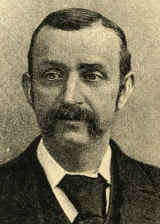
The rules of water polo are the rules and regulations which cover the play, procedure, equipment and officiating of water polo. These rules are similar throughout the world, although slight variations do occur regionally and depending on the governing body. Governing bodies of water polo include FINA, the international governing organization for the rules; the NCAA, which govern the rules for collegiate matches in the United States; the NFHS, which govern the rules in high schools in the USA; and the IOC, which govern the rules at Olympic events.

Big3 is a 3-on-3 basketball league founded by hip-hop musician and actor Ice Cube and entertainment executive Jeff Kwatinetz. The league consists of 12 teams whose rosters include both former NBA players and international players. The rules of Big3 games contain deviations from the official rules of 3-on-3 basketball as administered by FIBA. In January 2020, Big3 announced its rule set would be the core of a new basketball variant called "Fireball3".


















